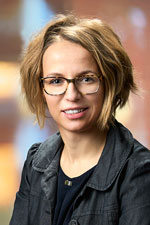Practical Look at Liquid Biopsy
Liquid biopsy is one of the newer methods of sampling cancer genome using a blood sample. Commercial offerings in that arena are rapidly expanding and staying informed regarding available assays can be challenging. Potential applications of liquid biopsy are broad, and many are currently being studied in clinical trials. The anticipated results have the potential to change cancer patients’ management and improve outcomes in the near future. However, is there a benefit of using liquid biopsy in standard clinical care today? In what clinical scenarios can this approach be beneficial? This session will discuss the basics of liquid biopsy and present clinical scenarios where this approach can be useful in today’s workup of oncological patients.
Originally published on June 5, 2023
Lecture Presenter
 | Anna P. Matynia, MD Associate Professor (Clinical) of Pathology |
Dr. Anna P. Matynia is a medical director of molecular oncology at ARUP Laboratories and an associate professor at the University of Utah School of Medicine. Dr. Matynia received her medical degree from Jagiellonian University. She then completed a hematopathology residency and fellowship as well as a molecular genetic pathology fellowship at the University of Utah School of Medicine. Her research interests include molecular diagnostics of hematolymphoid and solid tumor malignancies.
Objectives
After this presentation, participants will be able to:
- Describe the principles of liquid biopsy as the method of sampling tumor genome with its advantages and disadvantages
- Identify different categories of liquid biopsy assays currently available on the market and their limitations
- Discuss different clinical scenarios where the use of liquid biopsy may be beneficial in the workup of cancer patients
Sponsored by:
University of Utah School of Medicine, Department of Pathology, and ARUP Laboratories
 Site Search
Site Search






